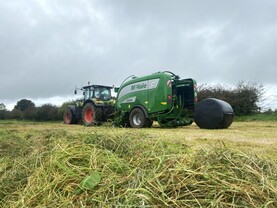Gas Networks Ireland operates and maintains Ireland’s national gas pipeline network which operates at pressures from 20 mbar up to 85 bar. It includes over 2,000km of large high-pressure transmission steel pipelines which transport gas across the country at pressures up to 85 bar through mainly rural areas.
When Vincent Cunningham, a dairy farmer from Burnchurch in Co Kilkenny wanted to clean an open drain on his farm he was fully aware that there was a gas pipeline traversing his land close to the spot where he intended to dig. Knowing the possible disruption, not to mention the potential dangers that exist when digging around high pressure gas pipelines, he understood the importance of contacting Gas Networks Ireland to notify them of the impending work.
Calling the freephone number of 1800 42 77 47 was the initial and only action that Vincent had to undertake alone. Once contacted, Gas Networks Ireland arranged for one of their dedicated agricultural liaison teams come out to assess the proposed dig and determine how close it was going to be to the pipeline. This service, provided by Gas Networks Ireland, is free of charge and is organised at a time that is convenient for the landowner.
On determining that a site visit is necessary, Agricultural Liaison Officer with Gas Networks Ireland, John Daly states, “we will locate the gas pipeline on the property and will supervise any work that needs to happen over that gas pipeline.” The priority for Gas Networks Ireland is to ensure that minimum disruption is imposed on the land owner and that they can get about their work safely and without delay. At the site of the proposed excavation work John Daly re-enforces this point as he explains that he first needs to mark out the centre line of the gas main and then ensure that any excavation carried out over the gas main is done “in a safe manner without delay to the farmer”.
According to Owen Wilson, Gas Network Ireland’s safety manager, “gas pipelines are quite safe when gas is kept in the pipeline”. Wilson emphasises the importance of contacting Gas Networks Ireland on their Dial Before You Dig line before commencing excavation or other groundworks, explaining that “the danger from pipelines comes when the gas is released in an uncontrolled way; and that can happen if somebody accidentally damages the pipeline when they're working near it.”
Not making that initial call could potentially lead to the landowner accidentally damaging the pipeline - either puncturing it at the time or even just damaging the coating which can cause corrosion at a later date. Wilson stresses that “at best, it's going to cause a massive amount of disruption to your work. At worst, it can be an awful lot worse than that.”
Vincent Cunningham, on his farm not too far from the medieval city of Kilkenny, urges landowners to ring the freephone number of 1800 42 77 47 before carrying out any work. He states that Gas Networks Ireland will come out and take you through the process: “They’ll mark out where the pipes are. It could save you a lot of problems down the line”. Most importantly however, he goes on to explain “it will keep you and those around you safe.”
Gas Networks Ireland has prepared two simple guides, ‘Safety Advice for Working in the Vicinity of Natural Gas Pipes’, and the ‘Safety Advice for Landowners’ which contain information on the risks associated with excavating near natural gas pipelines, the correct steps to take to stay safe and other useful information whenever you are excavating near gas pipelines.
For this guide, network maps and to find out more information including specific advice for farmers and landowners visit: www.gasnetworks.ie/dial






 This is a subscriber-only article
This is a subscriber-only article





